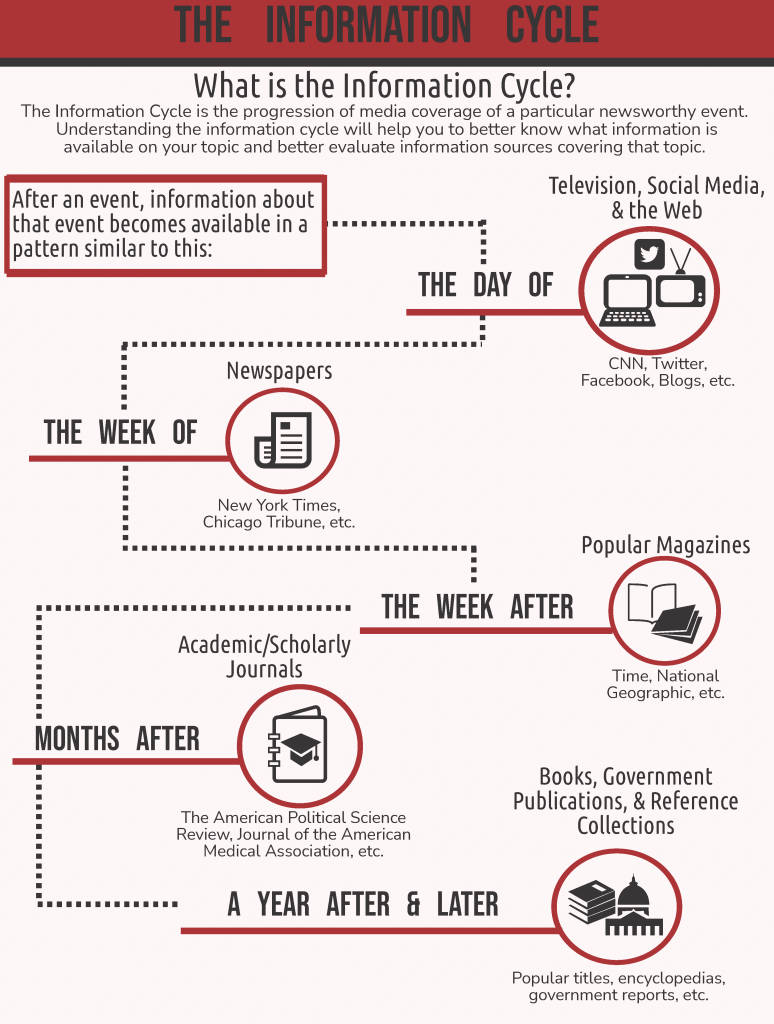What is the Information Cycle?
The term "Information Cycle" refers to the way that information is produced and distributed, and how it changes over time. Usually, it's used to describe the progression of media coverage relating to a particular newsworthy event or topic.
Understanding how the information cycle works will help you to know what kinds of information may be available on your topic as you locate and evaluate research sources.
The progression of the information cycle is connected to the amount of time after an event:
- Same Day - social networking (e.g., Twitter, Facebook), mobile communication (e.g., texting), mainstream media (TV, radio, Internet news sites)
- Next Day/Week of - newspapers
- Following Week(s)- popular magazines, general government information
- Six Months later - scholarly journals
- One year + later - books, government reports, reference material
Information Cycle
The information cycle shows how information is distributed after a significant event and how that information can change over time.

The Day of an Event
Television, Social Media, and the Web
- The who, what, why, and where of the event
- Quick, not detailed, regularly updated
- Authors are journalists, bloggers, social media participants
- Intended for general audiences
The Day After an Event
Newspapers
- Explanations and timelines of the event begin to appear
- More factual information, may include statistics, quotes, photographs, and editorial coverage
- Authors are journalists
- Intended for general audiences
The Week or Weeks After an Event
Weekly Popular Magazines and News Magazines
- Long form stories begin to discuss the impact on society, culture, and public policy
- More detailed analyses, interviews, and various perspectives emerge
- Authors range from journalists to essayists, and commentary provided by scholars and experts in the field
- Intended for a general audience or specific nonprofessional groups
Six Months to a Year or More After an Event
Academic, Scholarly Journals
- Focused, detailed analysis and theoretical, empirical research
- Peer-reviewed, ensuring high credibility and accuracy
- Authors include scholars, researchers, and professionals
- Intended for an audience of scholars, researchers, and university students
A Year to Years After an Event
Books
- In-depth coverage ranging from scholarly in-depth analysis to popular books
- Authors range from scholars to professionals to journalists
- Include reference books which provide factual information, overviews, and summaries
Government Reports
- Reports from federal, state, and local governments
- Authors include governmental panels, organizations, and committees
- Often focused on public policy, legislation, and statistical analysis
Example: The Information Cycle of the Boston Marathon Bombing
A Boston Globe tweet on the day of the marathon bombing:

https://twitter.com/BostonGlobe/status/323872661866442753?ref_src=twsrc%5Etfw
A Boston Globe article on the 102 hours spent trying to capture the suspects:

http://www.bostonglobe.com/metro/2013/04/28/bombreconstruct/VbSZhzHm35yR88EVmVdbDM/story.html
An Atlantic article about the suspect a few weeks after the event. The Atlantic is a print and online magazine that focuses on current events:
A peer reviewed article from one of the library's databases examining local politicians and city officials capturing the suspects alongside public opinion of their work:

A book about the events and brothers:

https://mcc-catalog.helmlib.org/cgi-bin/koha/opac-detail.pl?biblionumber=129815
Trial transcripts:

https://www.justice.gov/usao-ma/victim-and-witness-assistance-program/boston-marathon-case-updates
